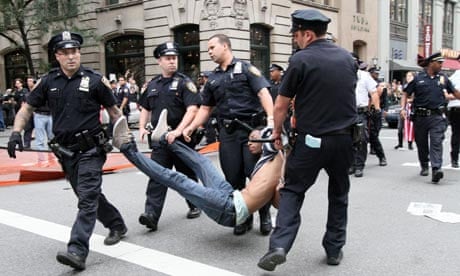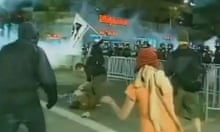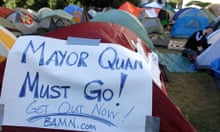Despite the images of a New York police commander pepper spraying non-violent female protesters and police use of tear gas and other projectiles against Occupy demonstrators in Oakland, there is a continuous plea to the police: join us. After all, police officers' union benefits and pensions are under attack around the country, putting them in the ranks of all other public-sector workers, who make up the last remaining vestige of the American blue-collar middle class.
"We are the 99%," protesters often cry during marches, with some gesturing to the police columns and adding, "and so are you."
Is it so simple? The Occupy Wall Street movement will hit its two-month birthday this month, and there are still reports of mass arrests and videos depicting excessive police force around the country. No cop has refused an order, though there is a rumor that in Denver, a cop publicly cried while forced to evict an encampment and said, "I can't do this anymore." Police unions have not joined the rest of the labor movement in supporting OWS – though in a nice twist of irony, the encampments have been a boon of overtime pay for the cops on OWS duty.
Eugene O'Donnell, a professor of police science at the John Jay College of Criminal Justice in New York, agreed that the OWS talking points of class inequality, the need for good jobs and call for investment in public services should resonate with police officers. "The cops don't see themselves as labor," he said. "It's a conservative culture – not politically, but conservative as slow-moving to change."
The police are still dogging the movement in other non-violent ways. The New York Daily News reported that cops have been urging drunks and homeless people to go to the encampment at Zuccotti Park, which overwhelms the food providers and overcrowds the tent city (the department denies the story). One New York police union official said lawsuits will follow if protesters assault police officers. It's a fatuous solution to a non-existent problem, and creates more division between OWS and frontline cops. But O'Donnell, a former cop, comments, "It's not your father's police department. It's more multi-ethnic, it's more gender-balanced. Progressive arguments resonate more if they are articulated well."
OWS protesters around the country are waiting for that moment of reckoning. The military also has conservative culture that is the antithesis of the horizontalism and counter-culture of OWS. But that didn't stop Marine Corps veteran Shamar Thomas from lambasting a group of dumbfounded cops in midtown Manhattan during an OWS march. Another Marine veteran, Scott Olsen, was seriously injured in the Oakland raid, and cops assaulted a group from Veterans for Peace during a demonstration in Boston.
So what is to account for this difference? For one thing, the benefits of being a police officer are pacifying. In New York and other places where public-sector unions are strong, police and firefighter benefits are handsome when compared to other people toiling in the 99%. A New York City cop or firefighter can conceivably retire by age 40, with a pension bringing in $50,000 or more a year to supplement another full-time career in private security, home repair services, bartending or whatever. It's a coveted position even in civil service: who would jeopardise that in this economy?
This contrasts heavily to the Iraq war veteran coming home to face high unemployment, or the hordes of other workers who have to put with more hours, less pay, and no defined retirement plan. These people have less to lose by joining the occupation.
In Zuccotti Park, individual protesters do start conversations with cops. It's a nice sight, but without the somewhat unlikely scenario of cops refusing orders or even an informal organisation of cops endorsing the ideas of the 99% movement, the moment for potential solidarity will pass as tensions escalate. And for many protesters, that is the plan. The offensive in Oakland may have been brutal, but it has only inspired protesters there to go further and call for a general strike. Arguably, it has been more helpful to OWS when the police have made headlines by overstepping and using excessive force, than if cops had decided to affiliate with the 99%. And we look set for more of the same.



